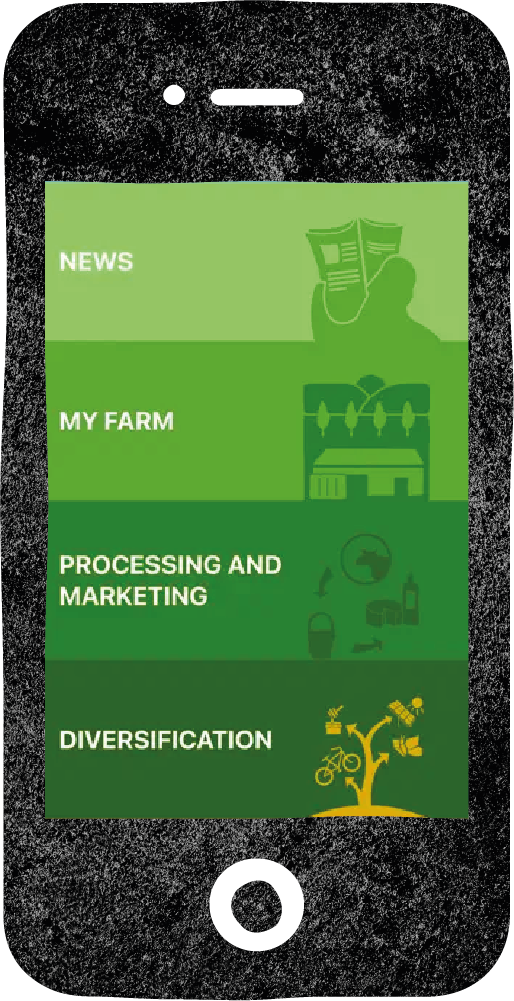Growth Partnerships
Delivering Projects Together
At Haller, our success lies in our understanding that every community is unique. Our approach is dynamic, tailored to evolving needs, circumstances and environments. Scaling our impact across Africa, we’ve enhanced accessibility to our Haller Journey, segmenting the holistic model into streamlined projects, aligning precisely with our partners and their communities' changing needs.
Guided by our core principles and the Haller Journey methodology, we embrace a building block approach. The progress and growth of each initiative we deliver, hinges on the success and dedication of our partners, working collaboratively over time to achieve shared goals and meaningful impact.
Through a social franchising model, Haller collaborates with new delivery partners, to scale our innovative app, farmer training and water security initiatives beyond Kenya.
Farmer Training Initiatives
At Haller, we go beyond just enhancing food production for farmers. Our focus is on imparting techniques for healthy and sustainable living, emphasising the vital importance of respecting and safeguarding the land. Building on the success of Haller Kenya; we collaborate with like-minded organisation with a wealth of unique expertise to implement Farmer Training initiatives that leave a lasting impact on both people and nature.
In Phase 1 of Grow projects, we concentrate on developing the Haller Demonstration plot - a hub for efficient land management to maximise sustainable food production. Communities gather here to learn regenerative farming practices and sustainable livelihood solutions. Recognising that change spans generations, we extend our efforts to younger generation through Youth Farming Programmes, working with partners to ensure a brighter and more resilient future for all.
Successful projects have the option to move onto Phase 2 - essentially smaller projects designed to support and build upon the foundational success of the Demonstration plot.
Grow projects are Eligible for NGOs & Established Community-Based Organisations with £50k of annual income or 10 employees
Water security, hygiene and sanitation
Haller’s model involves working with local communities to lay the groundwork for transformation. These processes create the crucial foundations for healthy soil and food production. We work with communities to provide water security, sanitation and hygiene (WASH) creating suitable conditions for smallholder farming.
Phase 1 projects involve the construction of WASH infrastructure - eco-loos, rain-fed dams and wells, ensuring access to clean and safe water, basic hygiene practices and improving health.
Bio-Loos are an effective, low-tech way of preventing contamination of the water sources we put in place, encouraging basic hygiene practices and improving health.
Wells* tap into the water table and ensure people have access to drinking water all year round, even in times of drought. Easy access to water increases food production, improves health, and reduces time-poverty, particularly for women. It is the basis for better lives.
Rain-fed dams* capture and retain rainwater that would otherwise be lost. That water is then used to rehabilitate the land, water crops in nearby plots and increase food production.
Once tangible impact has been achieved in Stage 1, Haller works collaboratively with partners to build on their successes to date, enabling long-lasting and meaningful change.
Haller’s core projects are enhanced by customisable add-ons, offering a range of advanced farmer training & sustainable livelihoods opportunities for income generation and skills development. These add-ons are entirely dependent on the changing needs of the communities we support and the aspirations of our partners organisations.
All of Haller’s programmes include an element of income generation. As well as providing much needed income, this financial incentive also serves to reinforce positive behaviour change, making communities less likely to reverse back to less sustainable lifestyles.
WASH projects are Eligible for NGOs & Established Community-Based Organisations with £50k of annual income or 10 employees.
*where possible, but Haller design is dependent on geological conditions
Licence Haller’s Tech
If you’re a like minded organisation wanting to utilise our app to share your knowledge with your beneficiaries, but also want to align it to your community and branding then you can partner with Haller. White labelling our technology to build out a tailored experience suited to your needs. Saving you time and money by utilising the ground work we’ve built up over the last 10 years. You can see below how Fundatia ADEPT have utilised our technology to create their own version of the Haller App experience.
Eligible for NGOs & Established Community-Based Organisations with £50k of annual income or 10 employees
Why do we need to do this?
Rural communities around the world continue to face unprecedented challenges brought on by climate change and biodiversity loss. Rainfall and temperature are increasingly unpredictable; soils are of poor quality or degraded through over-farming. Yields are often very low or dependent upon expensive chemical fertilisers.
Smallholders often lack knowledge of their choices around organic, climate-smart, and localised farming techniques; having little or no access to information or education services. As a result, food security is compromised, with farmers struggling to meet their basic needs and provide for their families; resulting in heightened vulnerability and poverty.
Smallholder farmers produce a third of the world’s food, and identifying measures to mitigate climate-related hazards is critical to protecting and supporting their livelihoods. We need to do this in order to safeguard global food security, given global food demand is anticipated to increase by 60% by 2050; with climate change already dramatically affecting agricultural productivity and crop yields.
Let’s work together.
Interested in working together? Fill out some info and we will be in touch shortly! We can't wait to hear from you!





